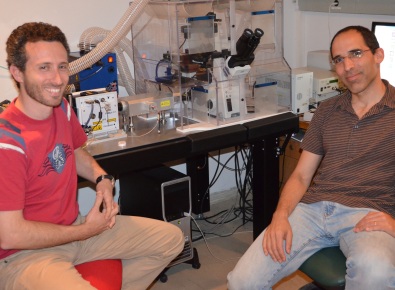| | 19 July, 2012
| | Researchers identify mechanisms that allow embryonic stem cells to become any cell in the human body | | Discovery could allow preparation of cells in the laboratory for treating Alzheimer's and other degenerative diseases |
 | | PhD student Shai Melcer (left) with Dr. Eran Meshorer at the Alexander Silberman Institute of Life Sciences, Hebrew University (photo: Eran Meshorer) |
|
New research at the Hebrew University of Jerusalem sheds light on pluripotency—the ability of embryonic stem cells to renew themselves indefinitely and to differentiate into all types of mature cells. Solving this problem, which is a major challenge in modern biology, could expedite the use of embryonic stem cells in cell therapy and regenerative medicine. If scientists can replicate the mechanisms that make pluripotency possible, they could create cells in the laboratory which could be implanted in humans to cure diseases characterized by cell death, such as Alzheimer's, Parkinson's, diabetes and other degenerative diseases.
To shed light on these processes, researchers in the lab of Dr. Eran Meshorer, in the Department of Genetics at the Hebrew University’s Alexander Silberman Institute of Life Sciences, are combining molecular, microscopic and genomic approaches. Meshorer's team is focusing on epigenetic pathways—which cause biological changes without a corresponding change in the DNA sequence—that are specific to embryonic stem cells. (Download photo of researchers.)
The molecular basis for epigenetic mechanisms is chromatin, which is comprised of a cell's DNA and structural and regulatory proteins. In groundbreaking research performed by Shai Melcer, a PhD student in the Meshorer lab, the mechanisms which support an “open” chromatin conformation in embryonic stem cells were examined. The researchers found that chromatin is less condensed in embryonic stem cells, allowing them the flexibility or ''functional plasticity'' to turn into any kind of cell.
A distinct pattern of chemical modifications of chromatin structural proteins (referred to as the acetylation and methylation of histones) enables a looser chromatin configuration in embryonic stem cells. During the early stages of differentiation, this pattern changes to facilitate chromatin compaction.
But even more interestingly, the authors found that a nuclear lamina protein, lamin A, is also a part of the secret. In all differentiated cell types, lamin A binds compacted domains of chromatin and anchors them to the cell’s nuclear envelope. Lamin A is absent from embryonic stem cells and this may enable the freer, more dynamic chromatin state in the cell nucleus. The authors believe that chromatin plasticity is tantamount to functional plasticity since chromatin is made up of DNA that includes all genes and codes for all proteins in any living cell. Understanding the mechanisms that regulate chromatin function will enable intelligent manipulations of embryonic stem cells in the future.
''If we can apply this new understanding about the mechanisms that give embryonic stem cells their plasticity, then we can increase or decrease the dynamics of the proteins that bind DNA and thereby increase or decrease the cells’ differentiation potential,'' concludes Dr. Meshorer. “This could expedite the use of embryonic stem cells in cell therapy and regenerative medicine, by enabling the creation of cells in the laboratory which could be implanted in humans to cure diseases characterized by cell death, such as Alzheimer's, Parkinson's, diabetes and other degenerative diseases.”
The research was funded by grants from the European Union (ERC, Marie Curie), Israel Science Foundation, Ministry of Science, Ministry of Health, The National Institute for Psychobiology, Israel Cancer Research Foundation (ICRF), Abisch-Frenkel Foundation and Human Frontiers Science Program (HFSP).
The research appears in the journal Nature Communications as Melcer et al., Histone modifications and lamin A regulate chromatin protein dynamics in early embryonic stem cell differentiation.
|
|


